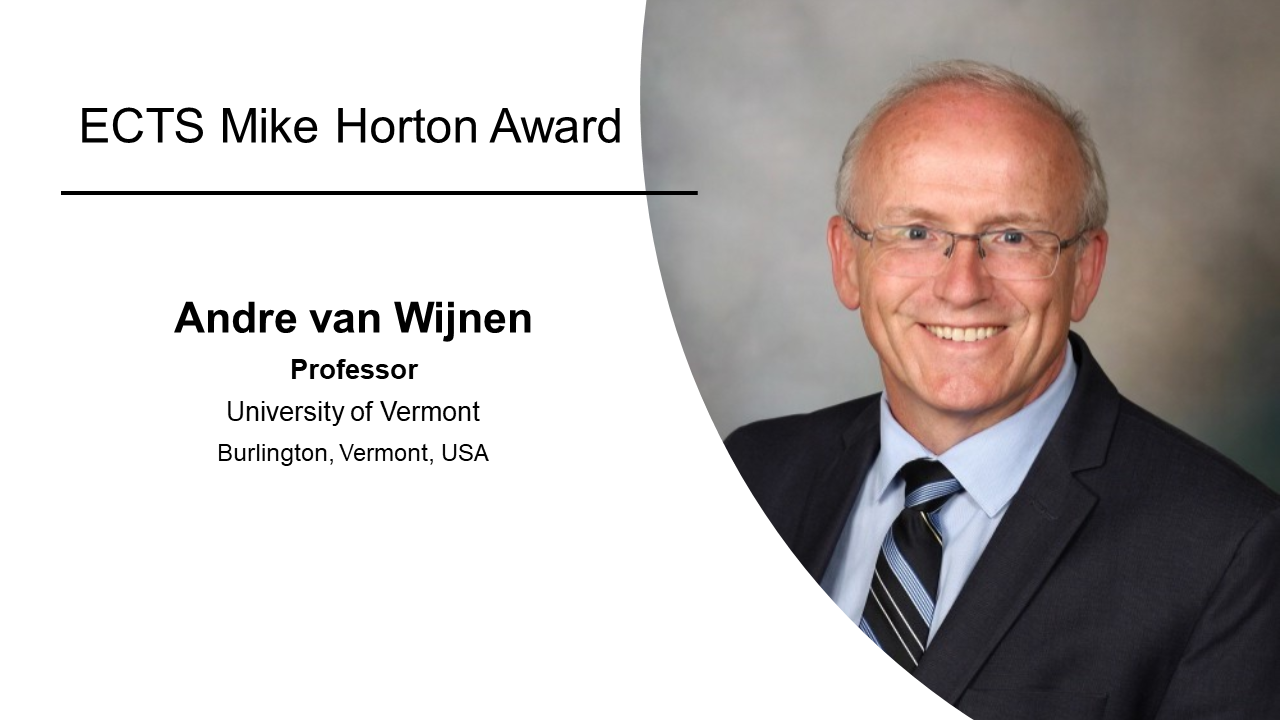ECTS Mike Horton Award
Nominations period: nominations will open in October 2024.
Professor Mike Horton (1948-2010) was a hematologist-turned-basic scientist who made significant contributions in the bone field and beyond. He performed pioneering work in osteoclast biology which resulted, among other things, in the recognition of the alpha v beta 3 integrin as a therapeutic target for inhibiting bone resorption. His warm personality and wide-ranging interests inspired many young researchers.
The award is for €1000 (Euros) and is announced during the ECTS annual congress.
Eligibility
The ECTS Mike Horton Award is open to individuals who have made a significant basic or translational contribution to the field of bone and calcified tissue.
ECTS Board members are not eligible to this award during term of office in the ECTS Board.
Submission Procedure
The Call for Nominations for the 2025 Mike Horton Award are now open till 10 December 2024.
Nominees must be nominated and seconded by ECTS members.
Nominations should be submitted via the online form.
Review Procedure
All nominations are reviewed by an independent panel of reviewers. The final decision is based on the marks and comments from the reviewers and any conflicts of interest are identified and dealt with appropriately.
Winner of the 2024 Mike Horton Award
Congratulations to Andre van Wijnen, Professor, University of Vermont, USA recipient of the 2024 Mike Horton Award presented during the ECTS 2024 Congress in Liverpool.
For a full list of previous Award recipients, please visit the Previous Grants section.
Professor Andre van Wijnen is a very active member of the biomedical community with long-standing track record of contributions to our understanding of biology and pathobiological disorders of bone. Andre started as a biochemistry student at the University of Utrecht (Netherlands) and the University of Florida (USA), before graduating in biomedical sciences at the University of Massachusetts Medical School (USA). While his overall repertoire of papers is vast and spans a very broad range of subject areas, his main focus in recent years has been on defining, translating and commercializing concepts in musculoskeletal regenerative medicine.
He has made pioneering contributions to the attractive concept that epigenetic enzymes can be developed as targets for new epigenetic bone anabolic drugs (‘epibolics’). He identified more than a dozen epigenetic regulators that control osteogenic lineage commitment and osteoblast maturation. Of these proteins, his work on EZH2 resulted in the development of new EZH2 inhibitors in collaboration with drug design specialists and industrial chemists. These efforts resulted in an NIH-funded business award to define a potential translational path towards clinical and commercial applications for new bone anabolic compounds.
A collaborative spirit is at the heart of his research and mode of action in general. Throughout his career, Andre developed a very inclusive, collaborative, enthusiastic and team-serving philosophy that promoted scientific interactions and fostered considerable research productivity through collaborations and a shared joy for science. His commitment to team science is reflected by his conceptual signature in a large volume of multidisciplinary collaborative studies with research groups across the globe. His dedication for research is exemplary and his enthusiasm is infectious. He has generously shared his vast knowledge, drive, creativity and speed of thinking to inspire young scientist. He has motivated and mentored numerous young scientists, while assisting them with developing the strategies and tools for starting their own careers.
Beyond research, Andre also has a very extensive record of service to the science. He has served the international bone community at large and served on the ECTS Board of Directors, American Society for Bone and Mineral Research (ASBMR) Council and the Bone Marrow Adiposity Society (BMAS) Board of Directors. He served on the Women’s Committee of the ASBMR, to support gender balance and equity in academic promotions, leadership elections and award nominations. He has also served as reviewer, government grant panelist, and as Editor-in-Chief for multiple journals.
In sum, it is difficult to capture the full impact of his achievements in research, education and service to the bone field in this short note. Andre van Wijnen is very deserving recipient of the ECTS Mike Horton Award, because he exemplifies the importance of basic and translational science, and he fosters creativity and innovation in research, education and service.
